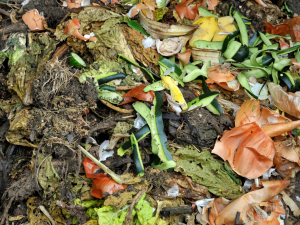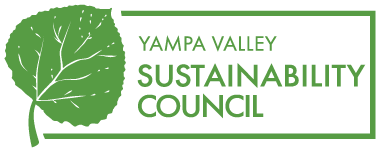Lily Svoboda, YVSC Intern | December 20, 2021
Today, one of the most important issues tied to sustainability is food waste. According to the Food and Agricultural Organization (FAO), approximately one-third of food that is produced for human consumption is wasted across the supply chain every year. This is especially concerning because food waste emits methane when landfilled. Methane is a potent greenhouse gas with a  warming potential that is 86-84 times more powerful than carbon dioxide over a 20 year period. In order to combat the issue of food waste, we need to adopt other methods of disposal such as composting.
warming potential that is 86-84 times more powerful than carbon dioxide over a 20 year period. In order to combat the issue of food waste, we need to adopt other methods of disposal such as composting.
Composting is a process that requires carbon, nitrogen, and water in order to break down organic material and turn it into a nutrient-rich soil. Carbon can be found in items such as cardboard, paper napkins, and egg cartons. Nitrogen can be found in food scraps like fruits, vegetables, meat, and grains. Water is essential in breaking down the organic material.
There are some types of composting that can be done at home such as vermicomposting, bokashi, countertop composters, and collection buckets. Vermicomposting is a process of composting that utilizes worms to help aid in the breakdown process. A container with air holes is filled with a source of carbon such as paper, dirt, food scraps, and red wiggler worms. The worms live in this container and eat the food scraps. Bokashi composting uses a special air-tight bucket that separates the food scraps from the liquids that are produced during fermentation. This liquid known as “bokashi tea” is an excellent fertilizer for plants. Countertop composters are a compact composting machine that can be placed in your kitchen. You add your food scraps and the machine will turn them into nutrient-rich compost. Another way to compost is to collect your organic waste and drop it off at a composting facility or at a local farm that accepts drop-offs.
An important development for composting in the Yampa Valley is Cowgirl Compost located in Hayden with pick-up in Steamboat Springs. This new facility provides an opportunity for Routt County to increase its current waste diversion rate. Routt county is currently diverting 12% of waste, while the new state goal is 45% recovery by 2036. This facility will be an opportunity for local businesses and organizations to compost their organic waste. It is important to act on issues locally and make bottom-up efforts. Our actions as a community help determine our future prosperity and health.






